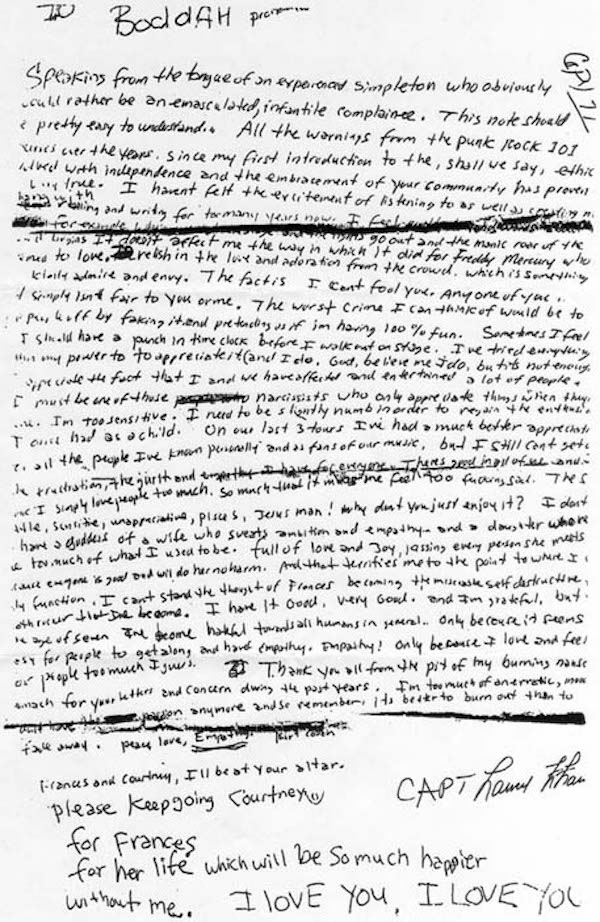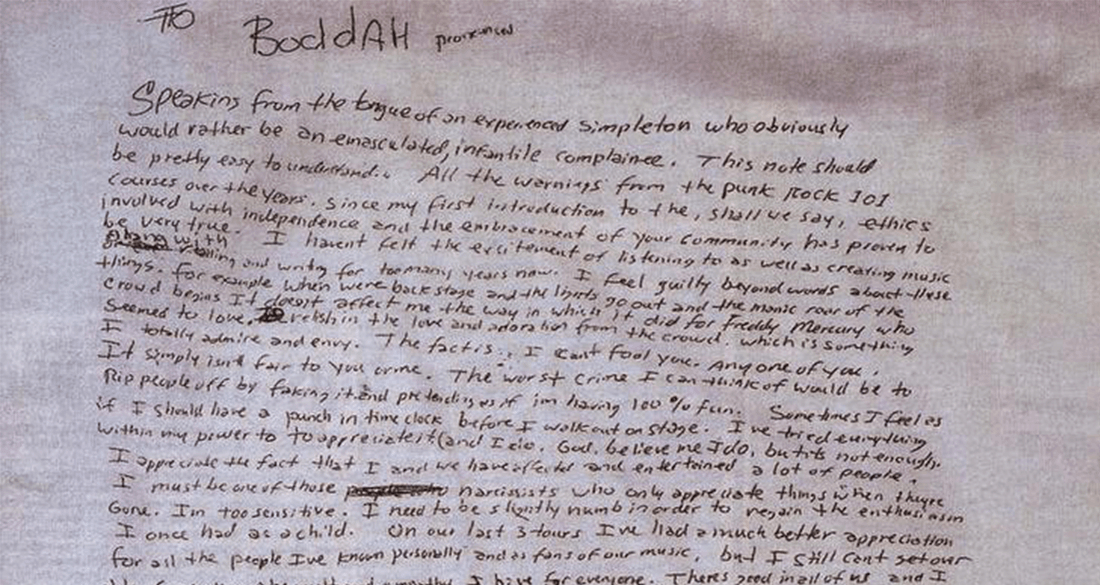Unveiling Kurt Cobain's Suicide Note: What Did It Say?
What secrets did the final words of a musical icon conceal, and how have they echoed through time? Kurt Cobain's suicide note, discovered in the wake of his tragic death, remains a haunting testament to the complexities of his life and a source of enduring fascination.
On April 5, 1994, the world lost a voice that defined a generation. Kurt Cobain, the enigmatic lead singer and guitarist of the American rock band Nirvana, was found dead in the greenhouse above the garage of his Seattle home. The discovery, three days later on April 8, 1994, sent shockwaves through the music industry and beyond. The investigation revealed heroin, cigarettes, a shotgun, and, most significantly, a suicide note penned by Cobain himself. This handwritten document, addressed not to his wife or daughter, but to his childhood imaginary friend, Boddah, offered a glimpse into the mind of a man grappling with inner turmoil.
The suicide note became an instant cultural artifact, sparking debate and speculation. Fans, music historians, and psychologists alike have dissected its contents, searching for clues to the artist's final decision. The note's emotional weight is undeniable, revealing Cobain's struggles with passion, fame, and the pressures of the music industry. Lines like "I don't have the passion anymore, and so remember, it's better to burn out than to fade away," resonate with a certain fatalism, reflecting the raw intensity that characterized Nirvana's music and Cobain's persona.
| Bio Data | Details |
|---|---|
| Full Name | Kurt Donald Cobain |
| Born | February 20, 1967, Aberdeen, Washington, USA |
| Died | April 5, 1994 (aged 27), Seattle, Washington, USA |
| Cause of Death | Suicide by gunshot |
| Known For | Lead singer, guitarist, and primary songwriter of the band Nirvana; a key figure in the grunge movement |
| Spouse | Courtney Love (m. 19921994) |
| Children | Frances Bean Cobain |
| Musical Career | Lead singer, guitarist, and songwriter for Nirvana (1987-1994) |
| Associated Acts | Nirvana, Fecal Matter |
| Influences | The Beatles, Black Sabbath, The Pixies, R.E.M., and many more |
| Legacy | One of the most influential musicians of the 1990s; helped popularize grunge music; his lyrics and music continue to resonate with fans around the world. |
| Reference | Nirvana Official Website |
The circumstances surrounding Cobain's death have been the subject of intense scrutiny. While the official cause of death was determined to be suicide, the details surrounding the event have fueled conspiracy theories and persistent questions. The shotgun wound to the head, the heroin found in his system, and the discovery of the suicide note all contributed to the narrative of a troubled artist succumbing to inner demons.
The note itself offers a complex and often contradictory picture. It reflects on Cobain's life, his regrets, and the pressures he faced. The words "Thank you all from the pit of my burning, nauseous stomach for your letters and concern during the past years" express a sense of gratitude, yet are immediately followed by the declaration, "I'm too much of an erratic, moody baby!" The juxtaposition of these sentiments reveals a mind wrestling with conflicting emotions.
Further analysis has revealed that the note isn't entirely straightforward. Certain handwriting experts have commented on its structure and the possibility of additional, later additions. Bart Baggett, president of Handwriting University International, analyzed the note, adding another layer of insight into the document. Questions regarding the authenticity of certain portions of the letter, or the potential for it to be misinterpreted, have added to the ongoing discussions about Cobain's final moments.
The legacy of Kurt Cobain extends far beyond his music. He became an icon for a generation disillusioned with the status quo. His raw, honest lyrics resonated with the anxieties and frustrations of youth, and his band Nirvana became the voice of a movement. Cobain's influence can be seen in countless artists who followed, and his music continues to be played and celebrated worldwide. Even the tragic circumstances surrounding his death further solidified his place in music history, making his final words that much more important.
In the aftermath of his death, the media coverage was intense, with discussions of drug addiction, mental health, and the pressures of fame. The federal bureau of investigation released a file regarding the death of Cobain, even after two decades since his passing, revealing even more details about the final events. The letter itself became a focal point, with its words scrutinized and debated. Some, like Sudjana and Fitri (2013), have utilized forensic linguistic profiling to analyze the note, aiming to determine the motives behind Cobain's suicide. The results indicated a man deeply affected by depression and the weight of his problems.
The note's impact has been magnified by the ongoing controversies and the enduring fascination surrounding the tragedy. Many point to the lines, "It's better to burn out than to fade away," as a crucial expression of his mindset. This phrase, lifted from Neil Young's song "Hey Hey, My My (Into the Black)", encapsulates a philosophy of living life to its fullest and leaving a lasting impact. However, this phrase, and others contained in the note, have generated ongoing debate about Cobain's final thoughts.
The note's unique structure, addressed to Boddah instead of his family, also invites further exploration. Some argue that this choice highlights Cobain's sense of isolation and his desire to communicate with someone he could confide in. Others have pointed to the possibility that the letter was meant to be private, a final expression of his inner thoughts that was never meant to be shared with the world. Still, the very act of its discovery and public release ensured its enduring presence in popular culture.
In another instance, a note found in Cobains wallet, written on stationary from a San Francisco hotel, provides further insight into his state of mind during those last few days. The note, brief and haunting, adds a different layer to the narrative. Similarly, the actions of Cobains wife, Courtney Love, have also been put under a microscope. The fact that Love took to the stage and read parts of the note during a ceremony, illustrates the enduring influence of the suicide note on the public consciousness. It showcases the way Cobains words continue to shape the story of his life and death.
The note left by Cobain has been viewed in various lights. For some, it's a window into a tormented soul; for others, it is a reflection of the pressures that he faced. The words continue to be analyzed, fueling debate and sparking speculation. The complexities and ambiguities of the note, however, ensure that the legacy of Kurt Cobain will continue to inspire and provoke for years to come.
The impact of Kurt Cobain's death, and the impact of the note he left behind, shows that even after many years his final words still have the capacity to move, provoke, and offer insights into the life of a music icon. The story behind the final words of Kurt Cobain remains a subject of unending interest, a testament to his lasting influence on music and culture. The exploration into his suicide note is a journey into the mind of a creative artist, leaving an unforgettable legacy.


